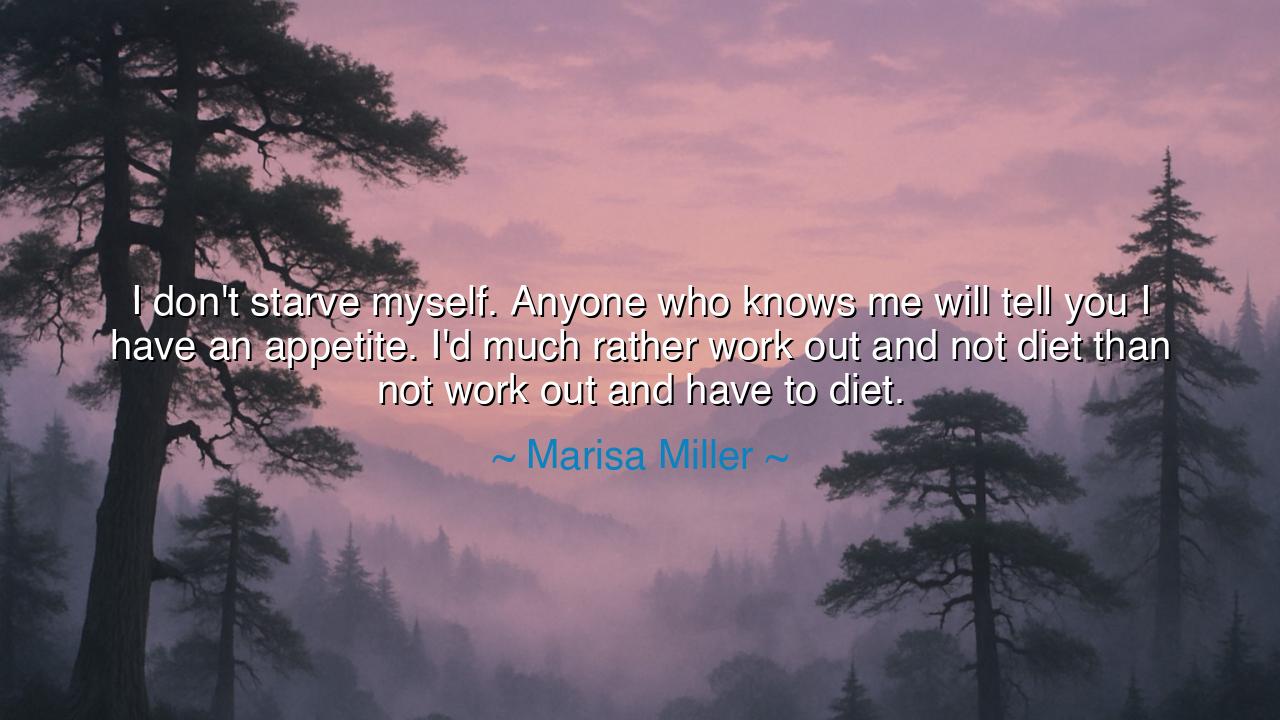
I don't starve myself. Anyone who knows me will tell you I have
I don't starve myself. Anyone who knows me will tell you I have an appetite. I'd much rather work out and not diet than not work out and have to diet.






Gather, O children of wisdom, and hear the words of Marisa Miller, who speaks with both clarity and strength: "I don't starve myself. Anyone who knows me will tell you I have an appetite. I'd much rather work out and not diet than not work out and have to diet." In these words lies a powerful declaration—a commitment to balance, to strength, and to the joy of movement. For she reveals a truth that has been passed down through the ages: true well-being is not found in deprivation, but in discipline and action. To nourish the body is not to deny it, but to honor its needs through effort and purpose.
In the times of the ancients, warriors, philosophers, and kings understood that to live a life of greatness, one must nourish the body with care and respect. The Spartans, famed for their physical prowess and indomitable will, did not attain strength by starving themselves or by seeking shortcuts. They practiced the art of discipline—not only in battle but in their daily habits. They knew that true strength came from rigorous training and from the balance of mind and body. They did not seek to punish their bodies through deprivation, but to build them through training, through movement, and through mindful nourishment. Marisa Miller’s words echo this same wisdom—movement is the key to maintaining vitality, while dieting alone is not enough to build strength.
Consider, O children, the story of Leonidas, the great Spartan king. When he was preparing his warriors for battle against the Persian Empire at the famous Battle of Thermopylae, he did not rely on mere dietary restriction to make them strong. No, he trained them to endure hardship, to embrace the difficulties of the body, and to move in ways that were both purposeful and strategic. The strength of the Spartan soldier was forged not in the absence of food, but in the sweat of effort, in the discipline of exercise, and in the wisdom of balanced living. Just as Leonidas prepared his men to face their challenges head-on, so too does Marisa Miller embrace the path of movement, for she knows that true strength lies not in denial, but in action.
Marisa Miller’s refusal to starve herself and her commitment to working out speak to a profound understanding of the body’s natural rhythms. She understands that to honor the body, to create lasting vitality, one must work with it, not against it. The act of dieting—often seen as a harsh, controlling force—becomes unnecessary when the body is allowed to move freely, to exercise its natural strength and grace. Movement is the key to unlocking the body’s full potential, and through it, we find not only strength but also freedom. To deny oneself food is to be enslaved by fear and self-control, but to embrace exercise is to celebrate the body’s ability to grow, to change, and to rise to the challenge.
In the modern age, where the pursuit of beauty and perfection often leads to extreme dieting and self-denial, Marisa Miller’s words are a beacon of truth. She speaks of the importance of balance—not in the form of rigid rules and restrictions, but in the mindful integration of activity and nourishment. To starve oneself, to deprive the body of its needs, is not the way of the wise. Instead, it is through regular exercise, through the practice of moving the body with purpose, that we build the foundation for both physical and emotional well-being. This lesson was known to the ancients, who understood that the body is not a burden to be controlled, but a vessel to be respected and nourished.
Thus, O children, the lesson is clear. Strength is not built through restriction, but through action. Marisa Miller teaches us that it is far better to embrace exercise—to move the body with purpose and to honor its natural rhythm—than to fall into the trap of dieting and deprivation. Like the Spartans and the great warriors of old, we must learn to nourish our bodies not by denying them, but by honoring their needs with effort, movement, and discipline. True health comes not from the absence of indulgence, but from the embrace of balance—a life lived with both vigor and wisdom.
And so, O children, as you walk your path, remember this wisdom: to starve yourself is to deny the gift of life; to move your body is to celebrate it. Discipline lies not in the deprivation of what the body desires, but in the wise nourishment and effort that lead to strength. Embrace the balance of action, and in that balance, you will find not just health, but the freedom to live fully, to rise above the constraints of the world, and to walk the path of true vitality.






AAdministratorAdministrator
Welcome, honored guests. Please leave a comment, we will respond soon